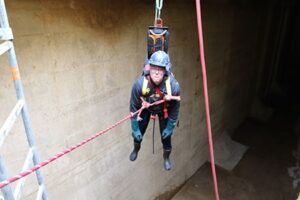
Confined space entry requires following these safety tips!
Tanks, silos, pits, manholes, and many other contraptions fall into the category of a confined space, according to OSHA. A confined space is any space with a limited entry that is not for long-term inhabitation. Some confined spaces are more dangerous than others and can cause an entrant to become trapped or injured. Jet Blast Inc. is careful to follow all procedures in keeping safe when the cleaning job requires a man to enter the unit. Below are the top confined space entry safety tips we keep in mind.
Permit or No Permit?
Some confined spaces require a permit to enter. According to OSHA, a permit is necessary when the confined space floor declines into a narrower space, contains toxic chemicals, contains live and exposed wires, or contains a material that can engulf the entrant.
Confined Space Entry PPE
Any person who enters a confined space must also wear the proper personal protection equipment. The PPE will often cover the full body, protecting the face, eyes, ears, hands, and lungs against any hazardous substance within the space.
Confined Space Entry Training
Every man that Jet Blast Inc. puts into a confined space undergoes training beforehand. Our OSHA-trained professionals are equipped to handle all aspects of confined space entry. Our employees will only put their training to use if they deem the project requires that method versus a no-entry method.
Have Monitors on Site
A monitoring attendant is necessary to be on the site at all times. His role is to be ready to respond to any emergency that could occur and make sure the conditions are safe. The attendant will never enter the confined unit himself.
Isolate the Area
If the confined unit typically receives liquid, sludge, or any material from an external source, the team must isolate and clear the unit from that material prior to entry. The team should also clear the area of associated equipment such as electrical, gaseous, hydraulic, and other systems.
Control the Atmosphere
Professionals should also clear, monitor, and ventilate the atmosphere of the confined space. They will need to eliminate any hazard in the atmosphere to the extent it cannot harm the person, force air into the space to ventilate, and use a sensor or detector to monitor atmospheric conditions.
Communicate Constantly
Communication between the entrant and the attendant is essential. Constant and clear communication is necessary to ensure everything goes well and to obtain safety in an emergency.
Contact Jet Blast Inc. Today!
Jet Blast® Industrial Services strives every day in an effort to provide our customers with the best service and equipment possible. Providing a safe and stable workplace has allowed us to keep a team of quality people with most having a tenure of 15 – 25 years with Jet Blast®. With all that experience under one roof, we have been able to provide reliable 24-hour service for over 42 years. I believe this helps to set us apart from the competition.
Compare us! Let us make your job easier. If you’re located in Maryland, Pennsylvania, Delaware, Northern Virginia, or Washington, D.C., contact us by email at [email protected], call us at 410-636-0730, or fax us at 410-789-3907, and don’t forget to keep in touch with us on Facebook!
